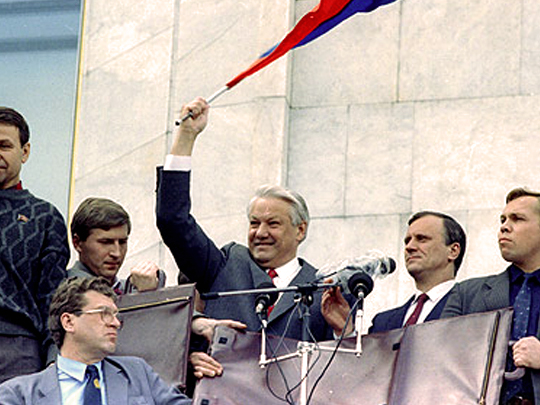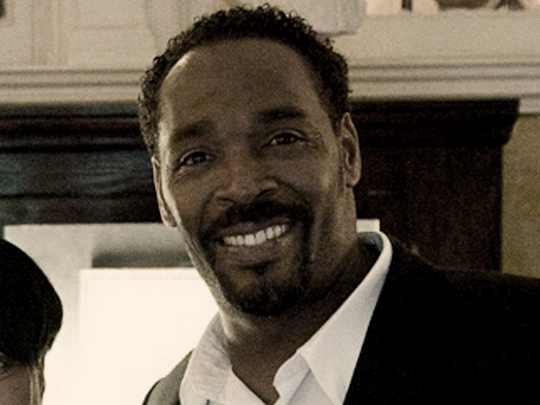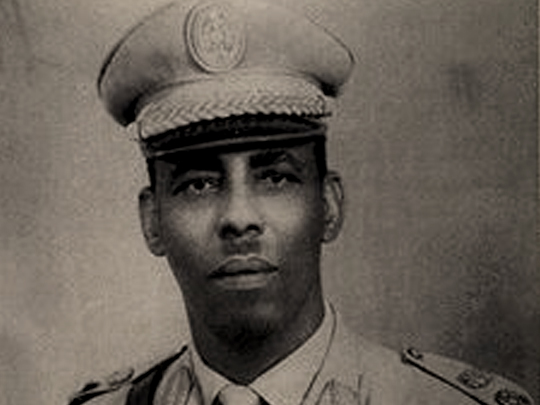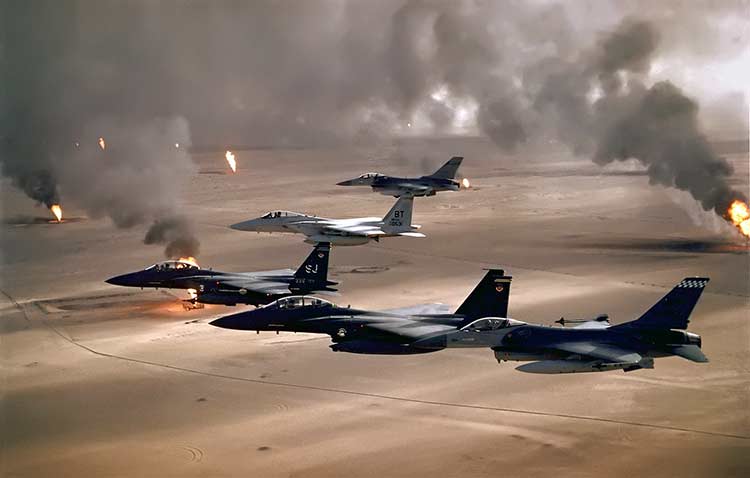US Air Force / Wikimedia Commons / CC-BY-SA-3.0 / GFDL
1 – Iraqi Soldiers Ignite Kuwaiti Oil Fields
The Kuwaiti oil fires were caused by retreating Iraqi military forces setting fire to as many as 732 oil wells, along with a number of oil-filled low-lying areas, such as oil lakes.
It was part of an Iraqi scorched earth policy while retreating from Kuwait due to the advances of Coalition military forces in the First Gulf War.
Iraqi military engineers also released oil into low-lying areas, constructing several “fire trenches”, to impede the advance of Coalition ground forces along Kuwait’s southern border.
The fires were first started in January 1991, and the first well fires were extinguished in early April, with the last well capped on November 6, 1991.
It is estimated as many as six million barrels of oil and between up to one hundred million cubic meters of natural gas went up in smoke per day.
2 – Soviet Coup d’état & The Dissolution of the Soviet Union

The 1991 Soviet coup d’état was an attempt made by high ranking members of the Soviet Union government to wrest control of the country from Soviet President Mikhail Gorbachev.
Communist Party hardliners, who came to be known as “The Gang of Eight”, feared the break-up of the Soviet Union due to a new treaty Gorbachev had negotiated, which would decentralize much of the government’s power to each of the Soviet republics.
On 19 August 1991, the Gang of Eight attempted the coup d’état, with Soviet Vice-President Gennady Yanayev signing a decree naming himself as acting president on the pretext of Gorbachev’s inability to perform presidential duties due to an “illness”.
The conspirators considered detaining Russian SFSR President Boris Yeltsin, but for unknown reasons did not do so, which proved fatal.
Yeltsin issued a declaration condemning the Gang of Eight’s actions as a reactionary anti-constitutional coup and urged the military not to take part in the coup.
The coup collapsed after only two days and Gorbachev returned to power, however, his authority and international standing were irreparably damaged.
After the capitulation of the Gang of Eight, the Soviet Supreme Court and Soviet President Mikhail Gorbachev described their actions as a coup attempt.
On 25 December 1991, Gorbachev announced his resignation, declaring his office extinct and handed over power to Russian President Boris Yeltsin.
The official dissolution of the Soviet Union took place the following day, granting self-governing independence to the Republics of the USSR.
The successful revolutions of Soviet Republics and the fall of the Berlin Wall in 1989, followed by the dissolution of the Soviet Union also marked the end of the Cold War.
3 – LA Police Severely Beat Rodney King

On 3 March 1991, Rodney King was violently beaten by LAPD officers during his arrest for speeding and evading police officers in California.
After spending the night watching basketball and drinking at a friend’s house, King’s car was spotted speeding on the freeway by Highway Patrol officers at approx. 12.30 am.
King was pursued at high speeds as he refused to pull over. He later admitted trying to outrun the police because a charge of driving under the influence would violate his parole for a previous robbery conviction.
The pursuit continued through residential streets at speeds ranging from 55 to 80 miles per hour, by which time a number of other police cars and a police helicopter had joined in the chase. After approximately 8 miles, officers finally cornered King’s car.
After initially refusing to leave the car, King was set upon by the officers, being kicked, struck with batons and tasered twice.
He suffered multiple skull fractures, a broken right ankle, and numerous bruises and lacerations. King’s two passengers were also injured by the officers.
The incident was filmed by George Holliday from his balcony nearby and sent to local news station KTLA. The footage, which showed King being severely beaten, gained attention from news media around the world.
Four police officers were tried on charges of use of excessive force, with three being acquitted and a verdict failing to be reached for the fourth.
The 1992 Los Angeles Riots started within hours of the acquittals, sparked by outraged African Americans.
It lasted six days, seeing 63 people killed and over 2,000 injured. It only ended after the National Guard, the U.S. Army, and the U.S. Marine Corps provided reinforcements.
The federal government prosecuted a separate civil rights case, which ended on 16 April 1993, with two of the officers being found guilty and sentenced to prison. The other two were acquitted of the charges.
The city of Los Angeles awarded King $3.8 million in damages, in a separate suit. He was found dead in his swimming pool two months after publishing his memoir in 2012.
4 – Dictator Siad Barre Flees Somalia, Ending His 22-Year Rule

Barre was the President of the Somali Democratic Republic from 1969 to 1991, when he was forced to flee following a civil war.
Having been a major general of the gendarmerie, Barre became President of Somalia after a coup d’état in 1969.
As President, and with support from the Soviet Union, Barre established Somalia as a one-party, Marxist–Leninist socialist state, renaming the country the Somali Democratic Republic.
Under Barre’s rule, banks and major industries were nationalized, and many cooperative farms were established.
After Somalia’s defeat in the Ogaden War against Ethiopia in the late 1970s, Barre’s popularity declined and led to the Somali Rebellion and eventual Civil War.
The Soviet Union ceased their support for Somalia during the Ogaden War, with Barre subsequently switching allegiances to the West and the United States.
During the 1980s, public opposition grew due to Barre’s increasingly dictatorial rule, and the sharp deterioration of the economy.
The state-sponsored genocide of the Isaaq clan throughout the eighties resulted in the deaths of as many as 200,000 people, and the displacement of up to half a million refugees, which resulted in the creation of the world’s largest refugee camp at the time in Ethiopia.
Finally, on 26 January 1991, Barre’s rule collapsed and he fled from the Somali capital, Mogadishu.
After he failed in his attempts to regain power, Barre was forced into exile in Kenya, before moving to Nigeria weeks later, where he died in 1995, aged 75.
